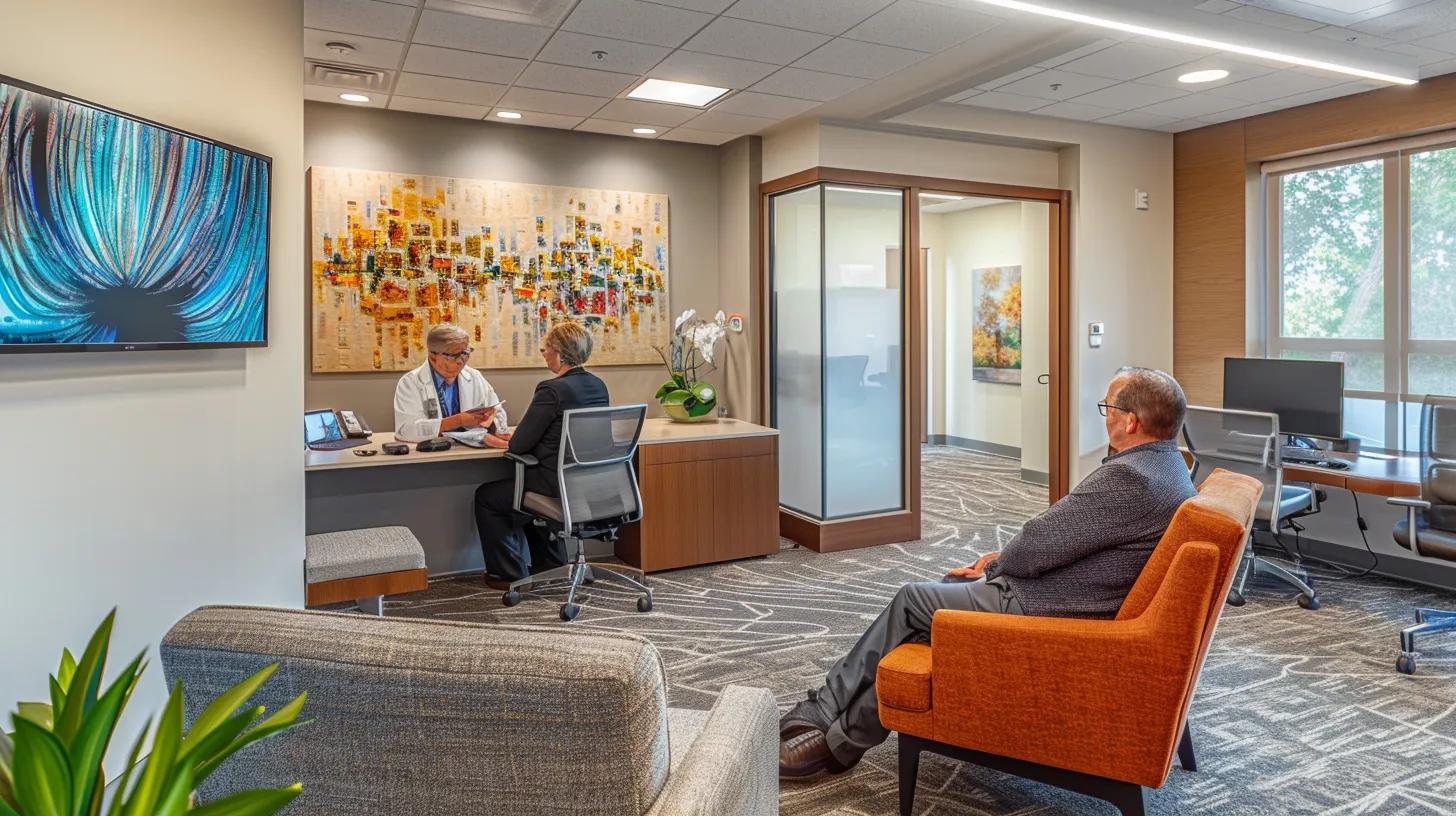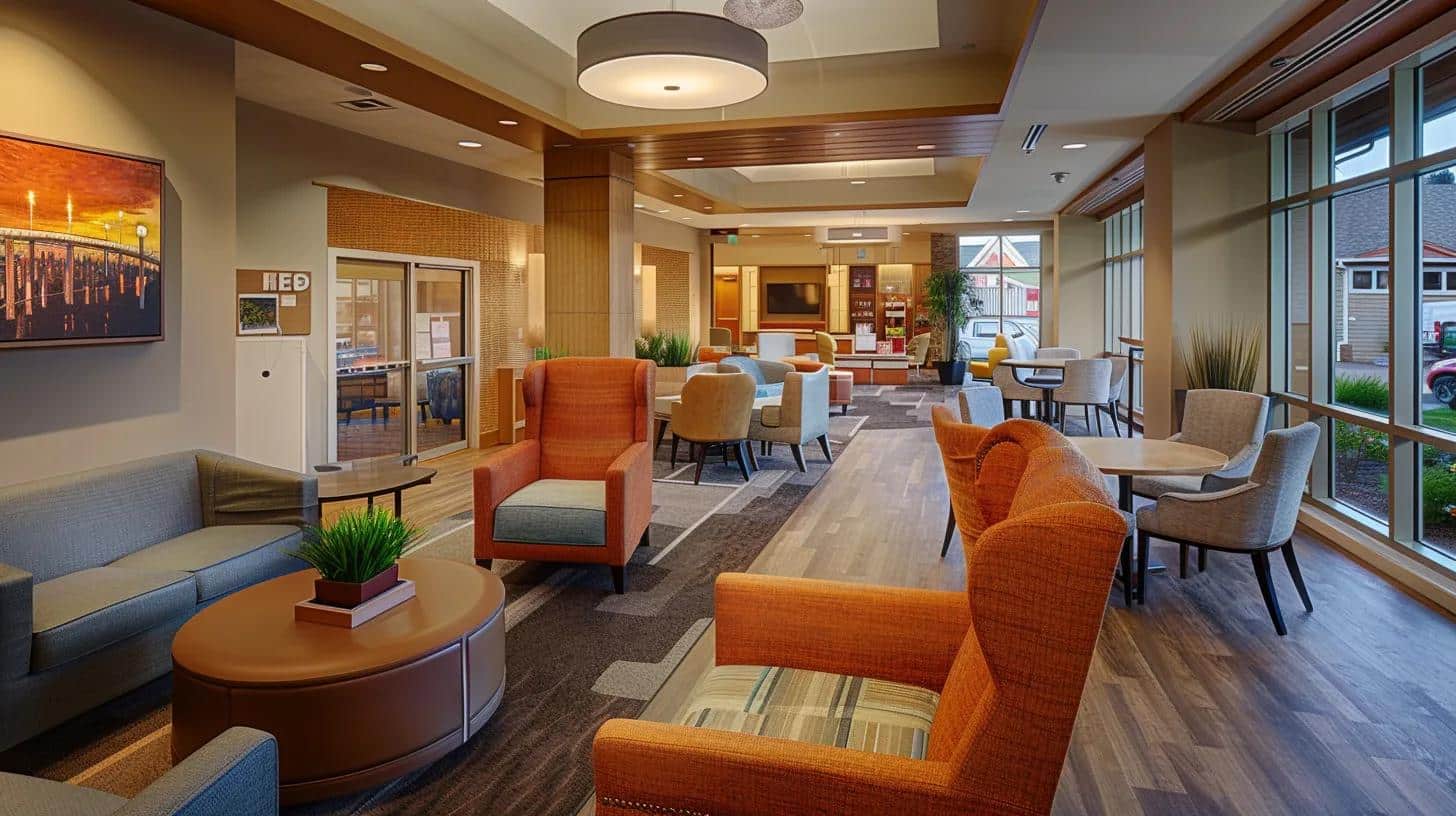Learn about the best memory care homes in Saline, MI. Compare options to find the ideal environment for loved ones needing specialized care and support.

Local Memory Care Homes Near Me for Personalized Care
Local Memory Care Homes Near Me for Personalized Care

Find Dementia & Alzheimer’s Facilities Near You
In an era when personalized care for seniors with dementia has become paramount, finding a memory care facility that meets clinical standards while offering a home-like environment is vital. Families, caregivers, and healthcare professionals increasingly seek nearby memory care homes where residents receive individualized attention, specialized programs, and a secure setting. This article provides essential information on selecting dementia and Alzheimer’s care facilities, understanding when to transition from home care, and identifying key features that distinguish high-quality memory care from other assisted living options. Topics include specialized services, staff training, geographic proximity, financial considerations, and legal aspects, empowering families to make informed decisions for their loved ones.
This article is organized into clearly defined sections covering the foundations of memory care, indicators for facility transition, quality features, search strategies, comparisons of care options, benefits of local facilities, financial planning, transition tips, specialized programs, and legal considerations.
Table Of Contents:
- Find Dementia & Alzheimer’s Facilities Near You
- Understanding Memory Care Homes Near Me
- Identifying the Right Time for Memory Care Homes Nearby
- Key Features of Quality Dementia & Alzheimer’s Facilities in Your Area
- Searching for Memory Care Homes Near Me Effectively
- Comparing Local Alzheimer’s and Dementia Care Options
- The Benefits of Choosing Local Memory Care Homes
- Financial Considerations for Memory Care Homes Near Me
- Making a Smooth Transition to a Nearby Memory Care Facility
- Specialized Programs in Dementia & Alzheimer’s Facilities Near You
- Legal and Ethical Aspects of Selecting Memory Care Homes Nearby
- Frequently Asked Questions
- Final Thoughts
Understanding Memory Care Homes Near Me
Memory care homes are specialized senior living facilities designed specifically for individuals with dementia and Alzheimer’s. Every aspect of these homes—from daily routines to therapeutic programs—is tailored to support memory retention, promote safety, and reduce confusion. They combine assisted living with medical oversight in environments designed to accommodate cognitive challenges. Alzheimer’s care.
Defining Memory Care for Dementia and Alzheimer’s
Memory care for dementia and Alzheimer’s addresses the complex challenges of memory loss and cognitive decline. Such facilities offer secure environments with features like locked entrances and wandering prevention systems. Residents receive help with everyday activities such as eating, medication management, and personal care. Routine-based programs, consistent social interactions, and guided activities help lower anxiety and support cognitive function and emotional stability.
Specialized Services Offered in Local Memory Care Facilities
Local memory care facilities provide a broad range of services to meet diverse resident needs. Key offerings include: • 24/7 on-site nursing care • Personalized care plans • Therapeutic interventions such as cognitive stimulation, reminiscence, and sensory activities • Structured meal plans to address nutritional needs • Supplemental programs like art therapy, music therapy, and memory games These services work together to stabilize cognitive function and enhance residents’ overall well-being.
Differentiating Memory Care From Other Senior Living Options
Memory care distinguishes itself from independent or regular assisted living by focusing on the challenges of cognitive impairments. Facilities are specifically designed and staffed to manage memory loss, using secure, controlled environments and personalized care plans that adjust as residents’ needs evolve. This specialized approach not only improves residents’ quality of life but also reassures families that the care environment is safe and purposefully managed.
The Importance of Proximity When Choosing a Facility
Close proximity to a
is important for frequent family visits and active involvement in care. Being nearby eases monitoring of treatment plans and facilitates prompt responses during emergencies. Local facilities typically integrate well with community resources such as nearby hospitals and social programs, while also maintaining a sense of community continuity for residents and their families.
Identifying the Right Time for Memory Care Homes Nearby

Determining when to transition to a memory care home involves carefully assessing the resident’s cognitive and physical needs. Early intervention can slow disease progression and alleviate the increasing burden on family caregivers.
Recognizing Early Signs of Dementia and Alzheimer’s
Early signs include: • Memory lapses and confusion over familiar places • Difficulty completing routine tasks • Changes in mood, personality, or language Such symptoms may gradually worsen, indicating that current home care might soon be insufficient.
Assessing Daily Living Challenges for Your Loved One
As dementia advances, everyday activities like bathing, dressing, and meal preparation become challenging. Increased incidents of falls, poor personal hygiene, or difficulty using household appliances signal that professional, round-the-clock support may be necessary to ensure safety and maintain dignity.
When Home Care Is No Longer Sufficient
Home care can be effective in early stages but may eventually become overwhelmed by the resident’s increasing needs. When specialized medical and therapeutic support is required continuously and safety risks mount, transitioning to a memory care facility becomes essential.
Safety Concerns That Indicate a Need for Specialized Care
Frequent incidents of falls, wandering, or the inability to manage household hazards are clear indicators that specialized care is necessary. Memory care homes are designed to address these risks by incorporating safety features such as secure outdoor spaces, emergency call systems, and advanced monitoring to ensure residents remain safe and supported.
Key Features of Quality Dementia & Alzheimer’s Facilities in Your Area
High-quality dementia care and Alzheimer’s facilities are marked by a structured, tailored approach to care. Critical features include expert staffing, secure environments, comprehensive therapeutic programs, and personalized care plans, all geared toward improving the resident’s quality of life.
Staff Training and Expertise in Dementia Care
Quality memory care facilities invest in continuous staff training. Caregivers receive specialized training in dementia care, including courses in cognitive and behavioral therapy. A low caregiver-to-resident ratio ensures that each resident gets individualized attention, directly impacting cognitive outcomes and emotional well-being.
Secure Environments to Prevent Wandering
Safety features are paramount: facilities incorporate controlled access, alarm systems, and clearly navigable layouts to prevent wandering. Enclosed outdoor areas and wearable tracking devices add extra protection, reducing the risk of accidents and ensuring faster emergency responses.
Availability of Therapeutic Programs and Activities
Therapeutic programs are designed to stimulate cognitive function and promote emotional well-being. Group and individual activities such as memory games, exercise classes, art therapy, music therapy, and sensory sessions encourage social interaction and routine engagement, which are essential in slowing cognitive decline and reducing feelings of isolation.
Personalized Care Plans Tailored to Individual Needs
Effective memory care relies on personalized care plans that start with comprehensive assessments. These plans address medication management, cognitive rehabilitation, nutritional needs, and social engagement. Regular reassessments and adjustments ensure that care remains aligned with the changing needs of residents.
Searching for Memory Care Homes Near Me Effectively

Locating a suitable memory care facility requires a multipronged approach combining online research, direct inquiries, and firsthand insight.
Utilizing Online Directories and Resources
Online directories and state health department sites offer detailed profiles of memory care facilities, including services, staff reviews, costs, and virtual tours. Filtering options such as “memory care facility with Alzheimer’s specialization” help families narrow choices efficiently.
Questions to Ask When Contacting Local Facilities
When calling a facility, ask about: • Staff training and caregiver-to-resident ratios • Types of therapeutic programs available • Safety protocols and emergency response capabilities • Accreditation, licensing, and trial stay options Clear answers to these questions help confirm whether a facility meets specific care needs.
The Value of Touring Potential Memory Care Homes
Facility tours offer firsthand insights into cleanliness, safety features, and the overall environment. Observing staff-resident interactions and asking on-the-spot questions can significantly aid in evaluating whether the home aligns with family expectations and care requirements.
Reading Reviews and Testimonials From Families
Firsthand testimonials on reputable websites and forums provide practical insights that complement factual data. Reviews discussing improvements in resident conditions, staff responsiveness, and billing transparency can help families form a comprehensive understanding of a facility’s performance.
Comparing Local Alzheimer’s and Dementia Care Options
When comparing memory care options, factors such as service range, staffing ratios, facility layout, and cost are crucial. A structured comparison helps ensure that the selected facility meets both
standards and individual care needs.
Evaluating the Range of Services at Different Facilities
High-quality facilities offer on-site medical support, personalized care plans, and specialized activities. Comparing these services helps highlight differences in the overall level of care and resident outcomes.
Understanding Staff-to-Resident Ratios in Nearby Homes
A lower staff-to-resident ratio is typically associated with more attentive and personalized care. Families should review staffing levels during regular and emergency shifts to ensure the facility can meet the residents’ needs consistently.
Assessing the Physical Layout and Accessibility of Facilities
Facilities with wide hallways, non-slip flooring, clear signage, and accessible design reduce confusion and prevent accidents. A well-organized layout not only ensures safety but also enhances overall resident comfort.
Comparing Costs and Payment Options for Memory Care
Costs for memory care vary widely. Families should request a complete breakdown of monthly fees, admission charges, and additional service costs. Payment options include private pay, long-term care insurance, Medicaid, and in some cases, Medicare. The table below provides an example comparison:
The Benefits of Choosing Local Memory Care Homes

Choosing a local memory care facility offers numerous advantages, including easier family visits and active engagement, strengthened community ties, and faster emergency response.
Easier Family Visits and Involvement in Care
Local facilities allow families to visit frequently, fostering a sense of familiarity and belonging that can reduce resident anxiety and improve cognitive function. Regular involvement also helps maintain clear communication with caregivers regarding any changes in health.
Connection to Familiar Community Resources
Staying local helps residents retain connections with community amenities such as parks and community centers, reducing feelings of isolation. Partnerships with local organizations can further enrich the care environment through joint activities and events.
Quicker Emergency Response and Access to Local Hospitals
Proximity to local hospitals and urgent care centers ensures faster emergency responses. Facilities located nearby adhere to strict safety protocols and maintain strong communication with local healthcare providers, which is crucial during medical emergencies.
Supporting the Local Economy Through Your Choice
Investing in a local memory care facility supports the community by maintaining local jobs and services. This economic contribution can lead to improved quality and continuity of care over time.
Financial Considerations for Memory Care Homes Near Me
Thorough financial planning is critical when selecting a memory care facility. Families must evaluate costs, understand payment options, and explore available benefits to make an informed decision.
Average Costs of Dementia and Alzheimer’s Facilities in Your Region
Monthly costs for high-quality memory care typically range from $5,000 to $8,000, depending on services and location. Families should request detailed fee structures and clarify any extra charges beyond the standard care package.
Exploring Insurance Coverage and Benefits
Insurance, particularly long-term care insurance, can help offset the high costs associated with memory care. It is important to compare policy benefits, deductibles, and overall coverage to ensure that the facility’s costs are manageable.
Understanding Medicare and Medicaid for Memory Care
While Medicare generally does not cover long-term care, Medicaid may help for eligible residents. Families should consult with financial planners to understand state-specific requirements and available support options.
Investigating Veterans Benefits for Eligible Individuals
Veteran benefits may cover aspects of memory care including room and board and medical services. Eligible families should research available programs through the Veterans Administration and local veterans service organizations to gain additional financial relief.
Making a Smooth Transition to a Nearby Memory Care Facility

A successful move to a memory care facility requires careful planning and considerate preparation for both the resident and family members. A smooth transition minimizes disruptions and supports emotional well-being.
Preparing Your Loved One for the Move
Preparation involves gentle conversations and gradual exposure to the new environment. Allowing residents to choose personal items for their new room can create a sense of ownership and comfort, easing the transition.
Personalizing Their New Living Space
Encouraging residents to personalize their space with familiar photographs, heirlooms, and preferred decor fosters a homelike atmosphere, which can reduce disorientation and promote emotional stability.
Communicating With Facility Staff During the Transition
Effective communication is key. Families should establish clear channels to receive regular updates from caregivers and address any concerns promptly, ensuring the transition adapts smoothly to the resident’s needs.
Coping Strategies for Families and Caregivers
The emotional impact of transitioning to a facility affects both residents and family members. Support groups, counseling, and informational workshops can help families manage mixed emotions such as guilt and relief while building resilience through ongoing communication and regular visits.
Specialized Programs in Dementia & Alzheimer’s Facilities Near You
Specialized programs in memory care enhance quality of life by targeting cognitive, physical, and emotional needs. These programs aim to slow symptom progression while encouraging engagement and social interaction. Dementia care is a crucial aspect of these programs.
Music and Art Therapy Programs
Music and art therapy offer creative avenues for self-expression and can trigger memory recall while reducing anxiety. Group sessions often enhance community bonding and improve residents’ overall mood.
Sensory Stimulation Activities
Sensory activities like tactile stimulation, aromatherapy, and gentle exercises help residents reconnect with their surroundings. These sessions are tailored to individual sensory thresholds, helping to reduce agitation and promote focus.
Physical Exercise and Mobility Programs
Structured exercise routines—such as balance exercises, walking programs, and strength training—are crucial for maintaining mobility and overall brain health. These programs are adapted to each resident’s abilities to ensure safety and beneficial physical activity.
Support Groups for Residents and Families
Support groups create networks where residents and families share experiences and practical advice. Facilitated by professionals, these groups help normalize the challenges of memory loss and offer emotional and informational support essential for long-term care success.
Legal and Ethical Aspects of Selecting Memory Care Homes Nearby

Legal and ethical diligence is essential when choosing a memory care facility. Families must ensure facilities comply with local regulations while protecting residents’ rights and dignity.
Understanding Resident Rights in Local Facilities
Resident rights typically include informed consent, privacy, freedom from abuse or neglect, and the right to individualized care. Reviewing these rights in contracts helps ensure that the facility meets all legal and ethical standards.
Reviewing Admission Agreements and Contracts
Thoroughly reviewing admission documents is critical to avoid unfavorable terms or hidden fees. Families should clarify all policies regarding termination, fee structures, and care provisions before committing.
Appointing a Healthcare Proxy or Power of Attorney
Establishing a healthcare proxy or power of attorney ensures that a trusted individual can make critical decisions on behalf of the resident, particularly when cognitive impairments impede decision-making. Early legal preparation safeguards the resident’s wishes and interests.
Ensuring Adherence to Local and State Regulations
Confirm that the facility holds proper licenses, certifications, and accreditation. Regular inspections and compliance with state and local guidelines are crucial indicators of a facility’s commitment to high standards of care.
Frequently Asked Questions
Q: What distinguishes a memory care facility from other senior living options?
A: Memory care facilities specialize in handling dementia and Alzheimer’s by offering secure environments, individualized care plans, and targeted therapeutic programs. They maintain lower caregiver-to-resident ratios and enhanced security to prevent wandering.
Q: How can I determine if it’s time to move my loved one to a memory care facility?
A: Early signs such as frequent memory lapses, difficulty completing daily tasks, increased falls, and disorientation suggest that home care is no longer sufficient, warranting a move to professional memory care.
Q: What should I ask during a tour at a memory care facility?
A: Inquire about staff training, caregiver ratios, available therapeutic programs, safety protocols, emergency response times, costs, payment options, and the structure of personalized care plans.
Q: Are memory care facilities more expensive than traditional assisted living?
A: Yes, due to specialized care and enhanced safety features, memory care facilities tend to cost more. However, their comprehensive services often justify the additional expense. Payment options include private pay, Medicaid, and long-term care insurance.
Q: How do specialized programs like music therapy benefit residents with Alzheimer’s?
A: These programs stimulate memory recall, reduce stress, and promote social engagement, leading to improved mood and cognitive function.
Q: What legal steps should families take before moving a loved one into a memory care facility?
A: Families should review admission contracts, understand resident rights, and establish a healthcare proxy or power of attorney. Verifying facility licenses and compliance with state regulations is also essential.
Q: How can I ensure the facility supports family involvement?
A: Look for facilities with open visiting policies, regular communication channels, and family support programs. Tours, family meetings, and involvement in daily activities help maintain strong family engagement.
Your Complete Guide to Memory Care Homes Near You
Memory care facilities provide critical, specialized care tailored to the needs of individuals with dementia and Alzheimer’s. With expert staff, secure environments, and comprehensive therapeutic programs, these homes enhance quality of life and ensure resident safety. Local memory care options offer additional benefits such as easier family visits, quicker emergency responses, and close community ties. By researching and comparing facilities carefully—covering financial, legal, and care quality aspects—families can choose the best environment to support their loved ones’ long-term well-being.


